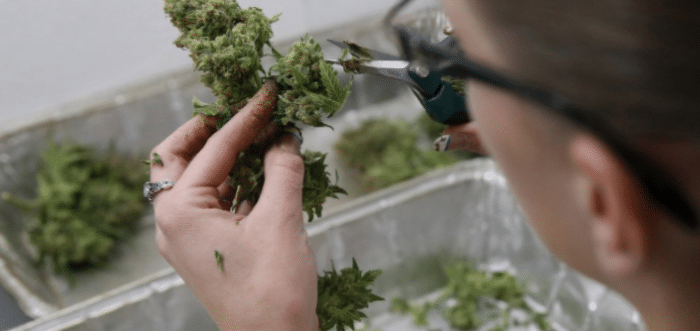The 2017-18 spending spree that lawmakers and the governor went on, courtesy of a $56.5 million boost in marijuana tax revenues, won’t be repeated in 2018-19, according to an analysis of those revenues presented this week to the Joint Budget Committee.
That led some JBC members to warn fellow lawmakers and the governor that they’d better be careful about new programs they want for 2018-19, because the money just won’t be there.
Marijuana sales tax revenues are expected to hit a bit of a hiccup in 2017-18, meaning less money to spend in the 2018-19 budget. The hiccup is due to the passage of Senate Bill 17-267, which eliminated a state sales tax of 2.9 percent on retail (recreational) marijuana sales. According to the JBC staff presentation Tuesday, the state will have about $115 million in tax revenue in 2018-19, about $9 million less than the $124 million that was available in 2017-18. But the slowdown is only transitory; in the following year, those revenues are expected to rebound and grow, and by 2019-20 are expected to exceed $137 million.
That one-year bump is already a problem for the Nov. 1 budget proposal submitted by Gov. John Hickenlooper. His budget called for $131.3 million to maintain existing programs and for new ones, including a $10 million request for a new program that would address the shortage of teachers in rural communities. The governor also has asked that $2.1 million in marijuana tax revenues be transferred to the general fund budget for 2018-19. Both might not happen, based on current revenue projections.
Marijuana tax revenues are used for a host of programs, mostly related to the industry. But some of those dollars have been tapped for nonmarijuana programs, including funding public school facilities. Since recreational marijuana was authorized by voters in 2012, $107 million has gone to the Public School Capital Construction Assistance Fund and another $34 million to the Public School Permanent Fund.
According to an analysis by JBC staffer Carolyn Kampman, the General Assembly put $117.5 million into programs funded by marijuana tax receipts in 2017-18, an increase of $56.5 million over the previous year. Kampman’s analysis attributed the increase in available dollars to two factors: increased sales taxes, and that the General Assembly didn’t need to tap into the tax revenues to shore up the General Fund. Lawmakers approved a transfer of $26.3 million for the 2017-18 budget.
That additional $56.5 million was used to boost funding in existing programs and to start up a bunch of new ones, such as affordable housing grants ($15.3 million), a school health professionals grant program ($9.4 million) and for “gray and black market” marijuana enforcement, the result of legislation passed in the 2017 session ($6 million).
The gravy train isn’t looking quite as good for the 2018-19 budget.
Kampman estimated that a total of $126.7 million will be available for the 2018-19 budget from marijuana tax revenues, based on current economic forecasts and tax fund reserves. Of that, $116.5 million will be required to maintain programs already funded by marijuana taxes, including the new ones added during the 2017 legislative session. Add to that the $13.3 million for new programs in the governor’s request, and another $2.1 million transfer to the General Fund, and the total reaches $131.3 million, or just under $5 million short.
Whether there’s enough to cover the governor’s request, which also must be approved by the JBC, will depend on revenue forecasts in December and March, Kampman’s analysis said. A rosier forecast supplied by the Department of Revenue estimated there would be $15 million more than the estimate from Legislative Council economists. If that higher projection comes to fruition, there will be enough money to fund all current requests.But Kampman’s analysis prompted concerns from JBC members about new programs that would be funded by pot taxes and planned by lawmakers for the 2018 legislative session.
Lawmakers seem to think the marijuana tax fund is “free money,” said JBC Vice Chairman Sen. Kent Lambert, a Colorado Springs Republican. Lambert said his biggest concern for 2018 is for a repeat of 2017, when a whole host of requests for marijuana taxes came through in the form of new legislation. “I’m concerned we will have a train wreck on this particular cash fund,” he cautioned.
Lambert noted that the JBC had enough revenues to cover requests from the 2017 session, but there’s no control over the financial size of bills that come from lawmakers, and that could create problems for balancing the budget.
JBC Chair Rep. Millie Hamner of Frisco referred to the 2017 spending as a “storm” of activity.
Tuesday’s briefing also drew a half-dozen lawmakers, mostly Republicans, who have expressed a wish that the budget-setting process be handled by legislative “committees of reference” rather than the JBC. Committees of reference have oversight over state agencies but not for budget matters. Those budget requests are handled by the JBC and managed through a four-month series of hearings that lead to the rollout of the annual budget bill, known as the Long Appropriations Bill.
Among those at Tuesday’s hearing, Republican Rep. Susan Beckman of Littleton, who said at one point that the budget process “does not reflect the wish of the body.” But that earned her something of a rebuke from fellow Republican Rep. Bob Rankin of Carbondale, who said there was plenty of opportunity for every member of caucus to participate in the budget process. “It’s called figure-setting,” Rankin said, adding that the Legislature traditionally “is not involved in line item by line item” decisions.
credit:420intel.com


